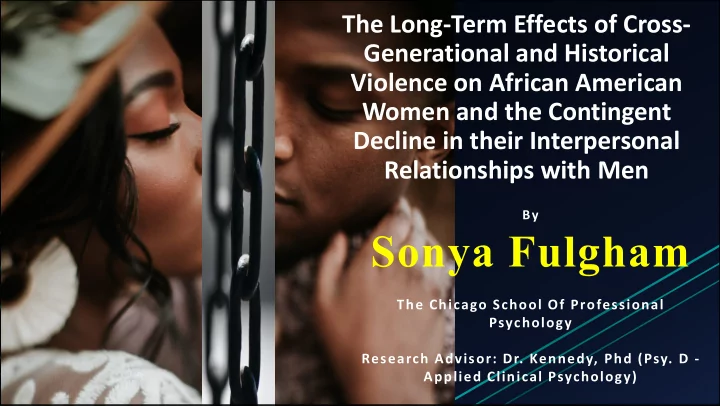

The Long-Term Effects of Cross- Generational and Historical Violence on African American Women and the Contingent Decline in their Interpersonal Relationships with Men By Sonya Fulgham The Chicago School Of Professional Psychology Research Advisor: Dr. Kennedy, Phd (Psy. D - Applied Clinical Psychology)
Abstract Using the posttraumatic slave syndrome (PTSS) framework as the basis and the ever-present anger symptom, I investigated the long-term effects of cross-generational and historical violence on African American women and the contingent decline in their interpersonal relationships with men. Secondary homicide crime and divorce data relating to African American, White, and Asian females (2010-2016) were obtained from the FBI Crimestat and the U.S. Census Bureau, respectively. The findings showed that African American females committed more homicide crimes than both Asian and White females. In addition, most of the homicide crimes committed by African American female offenders were against male victims.
The Problem • There is a notable decline in African American women’s interpersonal relationships with men on the one hand. • The African American woman carries with her more than the scars of slavery. She bears the pains and scars of the World Wars and the Vietnam War that were characterized by lengthy separations from men. • In 2010, married Black Americans accounted for only 31% in comparison to the 55% recorded by White Americans. More importantly for this research, Black American women registered a significant reduction in marriage rates. While 81% of White American women indicated a willingness to get married by the time they were 30 years old, only 52% of the African American women subscribed to this view (Cohn et al., 2011).
Purpose and Objectives Purpose • To elucidate upon the question of the long-term effects of cross-generational and historical violence on African American women and the contingent decline in their interpersonal relationships with men. Objectives 1. To review cross-generational and historical violence in the African American context. 2. To investigate the potential manifestation of cross-generational and historical violence in African American women. 3. To explore the long-term effects of cross-generational and historical violence on African American women’s interpersonal relationships with men. 4. To investigate the possible link between cross-generational and historical violence and the decline of African American women’s interpersonal relationships with men.
The PTSS Framework • The posttraumatic slavery syndrome (PTSS) framework results from “ trans- generational adaptations of behavior… associated with past traumas of slavery and on-going oppression ” (DeGruy, 2005, p. 13). • PTSS symptoms: • Racist Socialization: Manifests in the manner in which the African American community has adopted the persistent and historical racist beliefs that the dominant White culture engineered and perpetrated. • Vacant Esteem: “The state of believing oneself to have little or no worth, exacerbated by the group and societal pronouncement of inferiority” (DeGruy, 2005, p. 125). • Ever-present Anger: Entails experiencing chronic anger levels emotionally and manifests when one expresses anger with an intensity level that corresponds to the collective encounter of the African American trans- generational trauma more than the contextual individual stressor
Methodology Philosophy: Dominantly Positivist
Majority of homicide crimes committed by adult African American female offenders were against adult male victims
Analysis and results ANOVA: Homicide crime rates • African American female offenders (M= 275.29, SD= 104.372) committed statistically significantly more homicide crimes than Asian female offenders (M = 8.29, SD= 7.718, p< .001 ) • African American female offenders (M= 275.29, SD= 104.372) committed more crimes than White female offenders (M= 260.71, SD= 219.492), BUT the difference was not statistically significant (p> .001)
Analysis and results ANOVA: Divorce rates • African American female rates (M= 2094.57, SD= 82.627) was statistically significantly higher than female Asians’ rates (M= 383.14, SD= 50.274), p< .001) • White females’ rates (M= 11462.86, SD= 299.936) were statistically significantly higher than both that of African American females (M= 2094.57, SD= 82.627) and that of Asian females (M= 383.14, SD= 50.274), p< .001)
Analysis and results Bivariate Pearson correlation test • No statistically significant correlation between homicide crime rates committed by female African American offenders and Black female divorcee rates, (r (6) = .422, p= .346 )
Conclusions • African American women manifest cross-generational and historical trauma in them mainly through ever- present anger. • They mostly direct the ever-present anger towards men (proven through homicide crime rates) • The cross-generational and historical trauma (manifesting through ever- present anger) affects interpersonal relationships (potentially the reason behind rising divorce rates among African American women)
Recommendations • Establishment of dedicated, community-driven mechanisms to help the African American communities to understand cross-generational and historical trauma and how this contributes to their reactions to different situations. • The government at federal and county levels develops and implements inclusivity policies and increases investments dedicated towards supporting participative inclusivity and integration of the African American woman. • Establishment of physical and virtual cross- generational and historical trauma museums and social centers like the Social Centric Institute to help in educating the American people on this matter and its potential impacts on day-to-day lives including interpersonal relationships
Recommend
More recommend